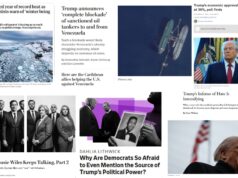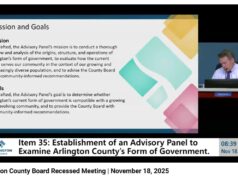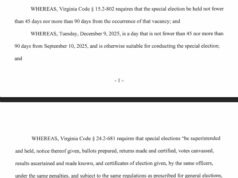by John F. Seymour, a long-time resident of Arlington and a past delegate to the Arlington Civic Federation
The Arlington Civic Federation was established more than 105 years ago to serve as a sounding board for County citizens on matters of public interest, regardless of political or partisan affiliation. Its 80+ member organizations range from neighborhood civic associations to issue-focused community groups such as the League of Women’s Voters, the Arlington County Taxpayers’ Association, and the Daughters of the American Revolution.
Although CivFed is open to virtually every Arlington organization, newcomers to its monthly meetings might be forgiven for thinking they’ve stumbled into the departure lounge of a Viking River Cruise or a Suze Orman financial planning seminar. Delegates to CivFed, scattered thinly amidst the vast auditorium at Arlington Hospital Center, are overwhelmingly older, whiter, and wealthier than Arlingtonians in general.
CivFed’s struggles with diversity are not unique. The County’s 50-odd advisory committees, citizen panels, work groups, and ad hoc task forces all find it difficult to recruit younger volunteers and persons of color. Older County residents, retired and frequently affluent homeowners in north Arlington, have both the time and resources to help shape County policy. The voices of renters, immigrants, and minorities are often muted, or unheard entirely, lost among the louder and more active voices of CivFed’s many fiscal conservatives.
CivFed is not unaware of the problem, however, and has tried for some time to expand its membership. Its most recent opportunity came in late March when Our Revolution Arlington (ORA) applied for membership. ORA is the local branch of Our Revolution, an activist grass-roots organization risen from the ashes of Senator Bernie Sander’s unsuccessful Democratic campaign. It trumpets a bold progressive platform of local reforms promoting a more democratic, just and sustainable County.
CivFed’s handling of ORA’s membership application, however, varied significantly from past practice. Over its history, CivFed’s consideration of membership applications has been largely ministerial. CivFed was invariably thrilled to hear that an applicant organization was aware of CivFed at all, and was willing to help fill out its ranks. Membership debates consisted of a brief introduction of the organization followed by a quick delegate vote, usually unanimous.
This time, though, CivFed’s Board of Directors insisted that ORA first prove that it did indeed have, as required by CivFed’s by-laws, at least 20 Arlington members. Unlike past applicants, ORA was not permitted simply to make that representation on its membership form. Rather, it was required to submit 20 names and addresses of Arlington residents. In addition, both Board members and delegates expressed, at length, their concerns that ORA may be excessively partisan and had endorsed candidates for state, local and national offices. Opponents of ORA’s membership insisted that was not the case with other member organizations and violated CivFed’s by-laws.
ORA freely admitted that it was a political entity, in that it represented groups of individuals with shared values, working toward a common goal, in the hope that the goal would be embodied, eventually, in law or policy. In that respect, though, ORA is much like many of the other issue-oriented membership organizations that make up CivFed. ORA also conceded that it had, on occasion, endorsed candidates for public office. Most recently, it endorsed Karishma Mehta in her bid to unseat Delegate Alfonso Lopez (Democrat) in the June 8th Democratic primary.
But other member organizations have also endorsed candidates, either directly or through their political action committees. The Arlington Education Association, for example, routinely endorses candidates for local political offices. The Arlington Coalition of Police endorsed a candidate in the County’s recent and highly contentious election for Commonwealth Attorney. The National Association for the Legalization of Marijuana endorses local candidates who support its position.
From its public pronouncements, moreover, ORA’s overriding purpose is, like CivFed itself, policy and issue-oriented. Among its most significant local initiatives are the promotion of community broadband to bridge the digital divide; the creation of a municipal energy system to counter Dominion’s monopoly and addiction to fossil fuels; and efforts to minimize Amazon’s effects on housing affordability. Whatever one’s view of these issues or the parent organization, One Revolution itself, the issues raised by ORA are pressing ones, particularly in our era of growing economic inequality. Yet, even in deep blue Arlington, they seldom find a champion.
Some delegates were surprised that one of the strongest voices supporting ORA’s membership was that of John Vihstadt, former County Board member and life-long Republican. Many Republicans today consider organizations such as Our Revolution to be, at the very least, card-carrying members of “Antifa” and quite possibly the Anti-Christ. But in his typically understated and nearly avuncular style, Mr. Vihstadt pointed out that, “although he was one of the ‘non-Democrats’ that One Revolution did not support” in his last political outing, ORA should be admitted to CivFed because it clearly “contributes to the civic dialogue” and, because, if CivFed has any pretension to being a “broad-based community organization that reflects the diversity of folks in Arlington,” it could not fairly refuse admission. Despite a deeply split CivFed, the delegates ultimately voted to admit ORA.
It is through such small and distressingly rare moments of political grace that we might, with time, restore both civility in civic discourse and strengthen one of the pillars of our democracy — full and fair representation and open debate on public issues. They also remind us of one of the great American virtues that, at least until recently, I had thought we all respected — that we should not fear to hear one another, and that the Republic itself is more important than party. Or, as ORA reminds us with its motto, “It’s Us, Not Me,” that the most precious and indispensable ingredient of a healthy democracy is a thriving, diverse community of interests.









![[UPDATED 1/29/26] Audio: Sen. Tim Kaine Talks to Blue Virginia About His “Five-Point Plan” to Fight Trump’s Orban-Like Assault on US Democracy; Civil Disobedience a la MLK Jr.; Trump’s Bogus “Energy Emergency”; the Crucial Importance of the 2025 VA Elections; etc.](https://bluevirginia.us/wp-content/uploads/2025/02/kaineinterview2-100x75.jpg)

